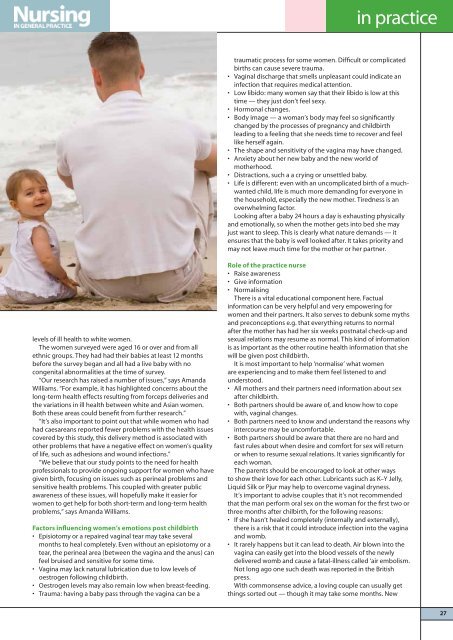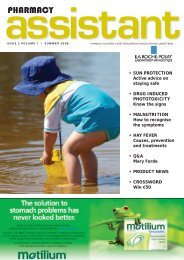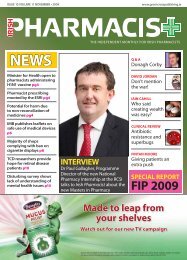veNTIlATIoN - Green Cross Publishing
veNTIlATIoN - Green Cross Publishing
veNTIlATIoN - Green Cross Publishing
Create successful ePaper yourself
Turn your PDF publications into a flip-book with our unique Google optimized e-Paper software.
levels of ill health to white women.<br />
The women surveyed were aged 16 or over and from all<br />
ethnic groups. They had had their babies at least 12 months<br />
before the survey began and all had a live baby with no<br />
congenital abnormalities at the time of survey.<br />
“Our research has raised a number of issues,” says Amanda<br />
Williams. “For example, it has highlighted concerns about the<br />
long-term health effects resulting from forceps deliveries and<br />
the variations in ill health between white and Asian women.<br />
Both these areas could benefit from further research.”<br />
“It’s also important to point out that while women who had<br />
had caesareans reported fewer problems with the health issues<br />
covered by this study, this delivery method is associated with<br />
other problems that have a negative effect on women’s quality<br />
of life, such as adhesions and wound infections.”<br />
“We believe that our study points to the need for health<br />
professionals to provide ongoing support for women who have<br />
given birth, focusing on issues such as perineal problems and<br />
sensitive health problems. This coupled with greater public<br />
awareness of these issues, will hopefully make it easier for<br />
women to get help for both short-term and long-term health<br />
problems,” says Amanda Williams.<br />
Factors influencing women’s emotions post childbirth<br />
• Episiotomy or a repaired vaginal tear may take several<br />
months to heal completely. Even without an episiotomy or a<br />
tear, the perineal area (between the vagina and the anus) can<br />
feel bruised and sensitive for some time.<br />
• Vagina may lack natural lubrication due to low levels of<br />
oestrogen following childbirth.<br />
• Oestrogen levels may also remain low when breast-feeding.<br />
• Trauma: having a baby pass through the vagina can be a<br />
in practice<br />
traumatic process for some women. Difficult or complicated<br />
births can cause severe trauma.<br />
• Vaginal discharge that smells unpleasant could indicate an<br />
infection that requires medical attention.<br />
• Low libido: many women say that their libido is low at this<br />
time — they just don’t feel sexy.<br />
• Hormonal changes.<br />
• Body image — a woman’s body may feel so significantly<br />
changed by the processes of pregnancy and childbirth<br />
leading to a feeling that she needs time to recover and feel<br />
like herself again.<br />
• The shape and sensitivity of the vagina may have changed.<br />
• Anxiety about her new baby and the new world of<br />
motherhood.<br />
• Distractions, such a a crying or unsettled baby.<br />
• Life is different: even with an uncomplicated birth of a muchwanted<br />
child, life is much more demanding for everyone in<br />
the household, especially the new mother. Tiredness is an<br />
overwhelming factor.<br />
Looking after a baby 24 hours a day is exhausting physically<br />
and emotionally, so when the mother gets into bed she may<br />
just want to sleep. This is clearly what nature demands — it<br />
ensures that the baby is well looked after. It takes priority and<br />
may not leave much time for the mother or her partner.<br />
role of the practice nurse<br />
• Raise awareness<br />
• Give information<br />
• Normalising<br />
There is a vital educational component here. Factual<br />
information can be very helpful and very empowering for<br />
women and their partners. It also serves to debunk some myths<br />
and preconceptions e.g. that everything returns to normal<br />
after the mother has had her six weeks postnatal check-up and<br />
sexual relations may resume as normal. This kind of information<br />
is as important as the other routine health information that she<br />
will be given post childbirth.<br />
It is most important to help ‘normalise’ what women<br />
are experiencing and to make them feel listened to and<br />
understood.<br />
• All mothers and their partners need information about sex<br />
after childbirth.<br />
• Both partners should be aware of, and know how to cope<br />
with, vaginal changes.<br />
• Both partners need to know and understand the reasons why<br />
intercourse may be uncomfortable.<br />
• Both partners should be aware that there are no hard and<br />
fast rules about when desire and comfort for sex will return<br />
or when to resume sexual relations. It varies significantly for<br />
each woman.<br />
The parents should be encouraged to look at other ways<br />
to show their love for each other. Lubricants such as K–y Jelly,<br />
Liquid Silk or Pjur may help to overcome vaginal dryness.<br />
It’s important to advise couples that it’s not recommended<br />
that the man perform oral sex on the woman for the first two or<br />
three months after chilbirth, for the following reasons:<br />
• If she hasn’t healed completely (internally and externally),<br />
there is a risk that it could introduce infection into the vagina<br />
and womb.<br />
• It rarely happens but it can lead to death. Air blown into the<br />
vagina can easily get into the blood vessels of the newly<br />
delivered womb and cause a fatal-illness called ‘air embolism.<br />
Not long ago one such death was reported in the British<br />
press.<br />
With commonsense advice, a loving couple can usually get<br />
things sorted out — though it may take some months. New<br />
27










